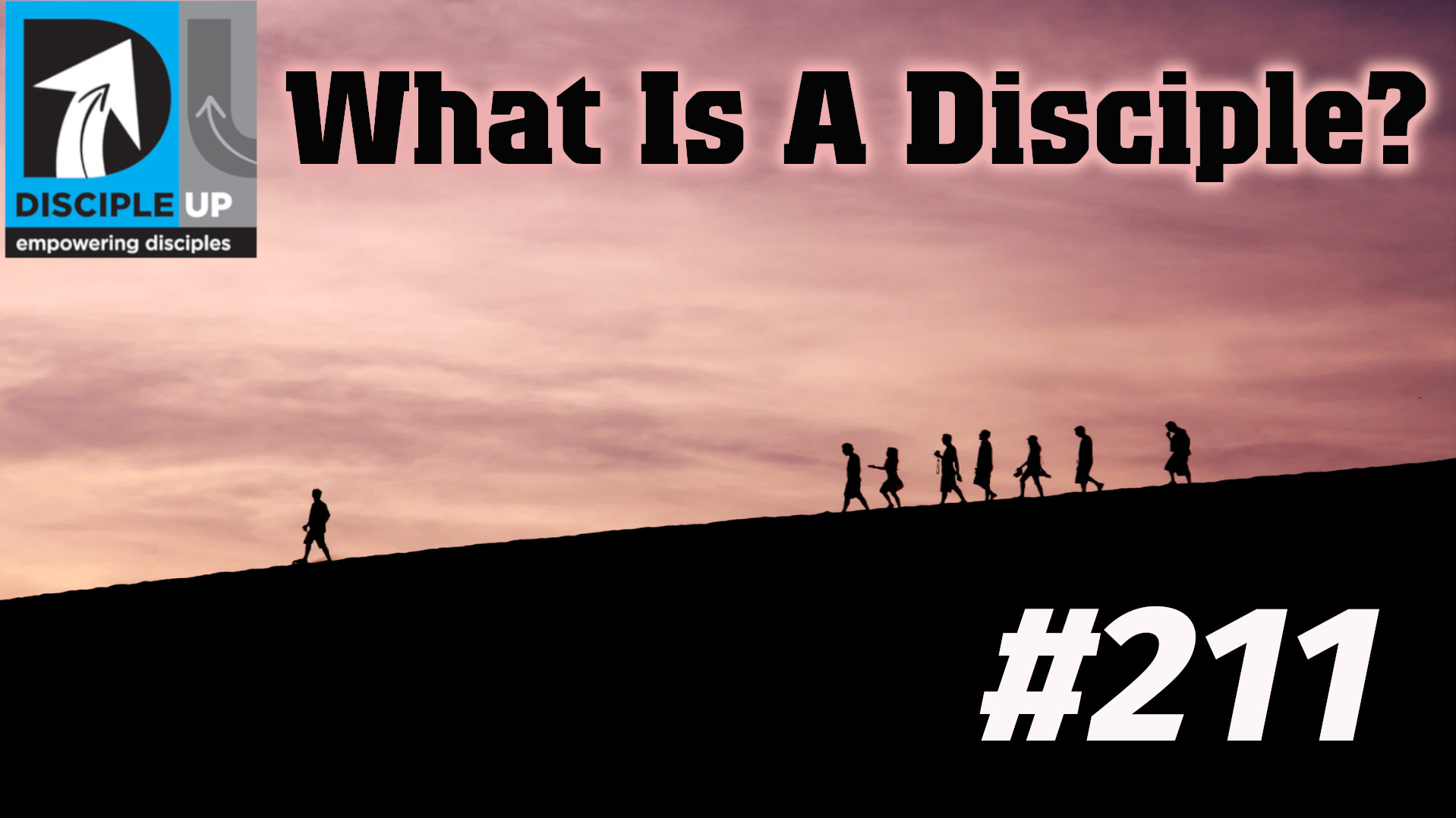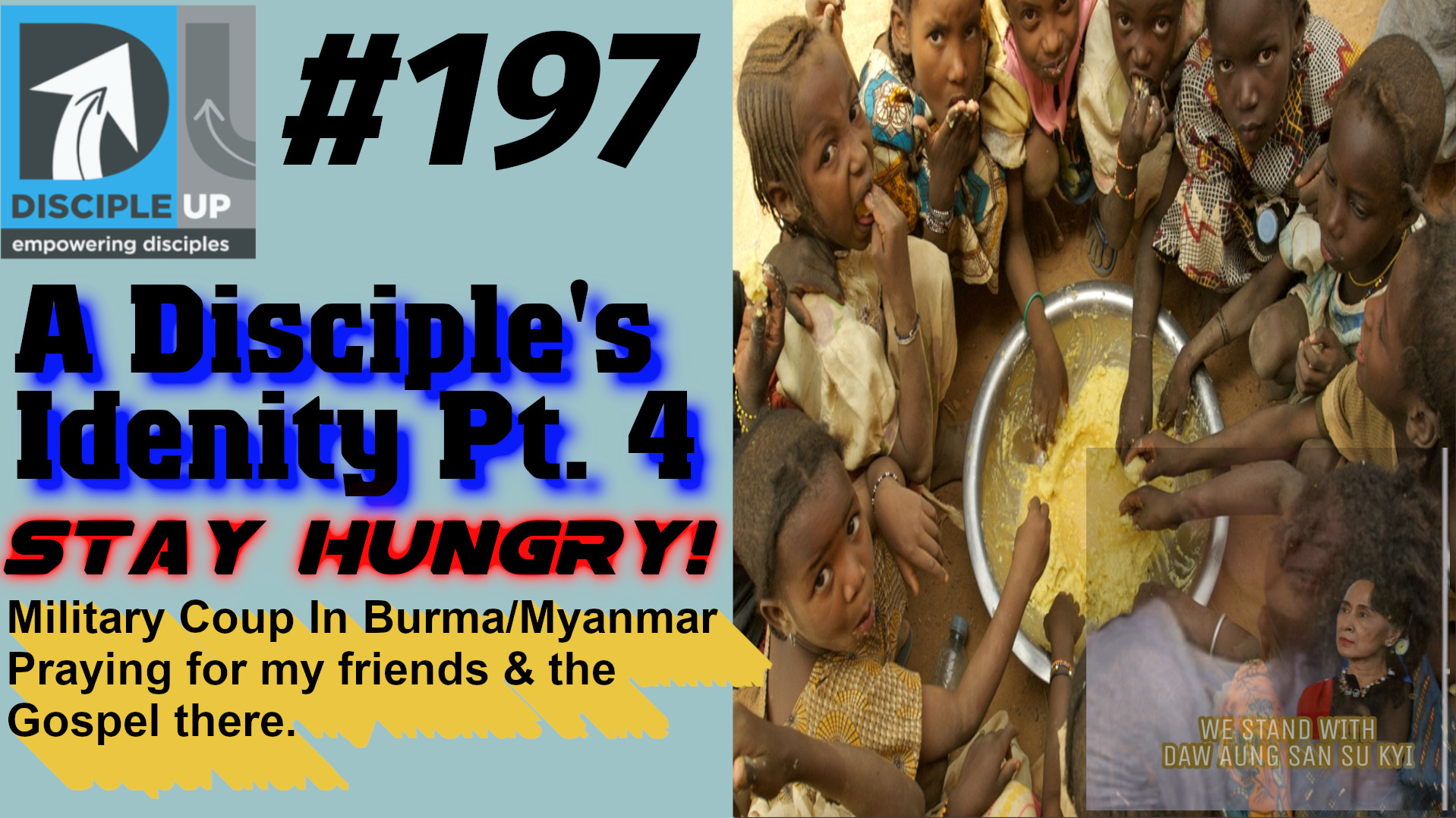Disciple Up # 211
What Is a Disciple?
By Louie Marsh, 5-19-2021
Intro.:
The Hebrew View of Discipleship:
Jesus began his first year of ministry by doing several things at once. He was traveling, teaching, performing what the Apostle John called “signs,” which are better known as miracles, and in the midst of all that he was recruiting an inner circle to follow him.
This recruitment was not unusual nor did it make Jesus stand out from other Rabbis. In fact it was something that almost all of them did and continued to do long past the first century A.D.
The Hebrew term for what it means to be a disciple is shimush chachamim. In context of the time, this means a “servant of the rabbis.” Serving is essentially the first stage of discipleship. You serve your rabbi as you learn how to follow the Word of God like he does. The object of discipleship is to follow, emulate, copy, duplicate, and replicate your rabbi, all while serving him.
According to the Babylonian Talmud, a disciple would carry the rabbi’s baggage, prepare his food to his liking, and provide him with money for his needs. A disciple could not contradict his rabbi in public or rule against his rabbi in matters of the Torah. A disciple was obligated to protect his rabbi. As you can see from this Jesus gave his disciples extraordinary latitude in allowing them to debate with him. Here’s two examples:
“27Just then his disciples came back. They marveled that he was talking with a woman, but no one said, “What do you seek?” or, “Why are you talking with her?” 28So the woman left her water jar and went away into town and said to the people, 29“Come, see a man who told me all that I ever did. Can this be the Christ?” 30They went out of the town and were coming to him. 31Meanwhile the disciples were urging him, saying, “Rabbi, eat.” 32But he said to them, “I have food to eat that you do not know about.” 33So the disciples said to one another, “Has anyone brought him something to eat?”” (John 4:27–33, ESV)
“32But they did not understand the saying, and were afraid to ask him.” (Mark 9:32, ESV)
We have a fascinating text that demonstrates what it means to be a disciple: “But Jehoshaphat said, ‘Is there no prophet of the LORD here, that we may inquire of the LORD by him?’ So one of the servants of the king of Israel answered and said, ‘Elisha the son of Shaphat is here, who poured water on the hands of Elijah’ (2 Kings. 3:11 NKJV). The prophet Elisha’s greatness is demonstrated by describing him as a disciple of Elijah the prophet. And the greatness of his discipleship is that he had the privilege to help Elijah wash his hands.
In turn, the duties of the rabbi are first of all to teach Torah. He would train his disciples to emulate him and even surpass himself in knowledge and practice of the Torah. The rabbi was obligated to protect his disciples from heresy and from sin. For this reason, the rabbi has the privilege to reprimand his disciples and judge their action.
These instructions are taken very seriously by the Jewish community from the first century A.D. and in some circles even up to this very day.
For Jews the issue of disciples is one of the most important issues for the preservation of Judaism and of the Jews themselves. Discipleship creates a chain and a continuum that insures that the next generations will continue to be related to and influenced by the Torah that God gave Israel at Mount Sinai. Without disciples of Moses and then Joshua and then the prophets, there would be no Judaism today.
DISCIPLE – Greek Word and usage
(1) Usually a substantive (μαθητής, mathētés, “a learner,” from manthánō, “to learn”;
Latin discipulus, “a scholar”):
The word is found in the Bible only in the Gospels and Acts. But it is good Greek, in use from Herodotus down, and always means the pupil of someone, in contrast to the master or teacher
In all cases it implies that the person not only accepts the views of the teacher, but that he is also in practice an adherent. A disciple is a “follower,” someone who adheres completely to the teachings of another, making them his rule of life and conduct.
The word has several applications. In the widest sense it refers to those who accept the teachings of anyone, not only in belief but in life. Thus the disciples of John the Baptist (Matthew 9:14; Luke 7:18; John 3:25); also of the Pharisees (Matthew 22:16; Mark 2:18; Luke 5:33); of Moses (John 9:28).
But its most common use is to designate the adherents of Jesus. (a) In the widest sense (Matthew 10:42; Luke 6:17; John 6:66, and often). It is the only name for Christ’s followers in the Gospels. But (b) especially the Twelve Apostles, even when they are called simply the disciples (Matthew 10:1; Matthew 11:1; Matthew 12:1, et al.).
In the Acts, after the death and ascension of Jesus, disciples are those who confess Him as the Messiah, Christians (Acts 6:1-2, 7; Acts 9:36 (feminine, mathétria); Acts 11:26, “The disciples were called Christians”). Even half-instructed believers who had been baptized only with the baptism of John are disciples (Acts 19:1-4).
Early Christians referred to the faith as “The Way.” This is found often in the book of Acts, here’s a few examples:
“2and asked him for letters to the synagogues at Damascus, so that if he found any belonging to the Way, men or women, he might bring them bound to Jerusalem.” (Acts 9:2, ESV)
“23About that time there arose no little disturbance concerning the Way.” (Acts 19:23, ESV)
“14But this I confess to you, that according to the Way, which they call a sect, I worship the God of our fathers, believing everything laid down by the Law and written in the Prophets,” (Acts 24:14, ESV)
“22But Felix, having a rather accurate knowledge of the Way, put them off, saying, “When Lysias the tribune comes down, I will decide your case.”” (Acts 24:22, ESV)
This term appeared to die out in favor of a new term that was given to the church as opposed to the one they apparently chose for themselves. And that is the word Christian.
Jesus used the term disciple but never Christian. The first instance of the word Christian is found in the book of Acts: “The disciples were first called Christians in Antioch” (Acts 11:26). Most Bible scholars agree that it is unlikely that the believers themselves thought up the name “Christians.” The early church had other names for themselves, such as “disciples” (Acts 13:52; 20:1; 21:4) and “saints” (Romans 1:7; 1 Corinthians 16:1; Ephesians 1:1) and “brothers” (1 Corinthians 1:9; 1 Peter 3:8).
The name “Christian,” meaning “belonging to Christ,” appears to have been invented by those outside of the church. It was most likely meant as a derogatory term. Only two other times does the word appear in the New Testament (Acts 26:28; 1 Peter 4:16). The idea that the term Christian was originally a pejorative finds some support in 1 Peter 4:16: “However, if you suffer as a Christian, do not be ashamed, but praise God that you bear that name.”
Please Get In Touch!
Email – louie@discipleup.org

Check out the Disciple Up Facebook page:
My books –












